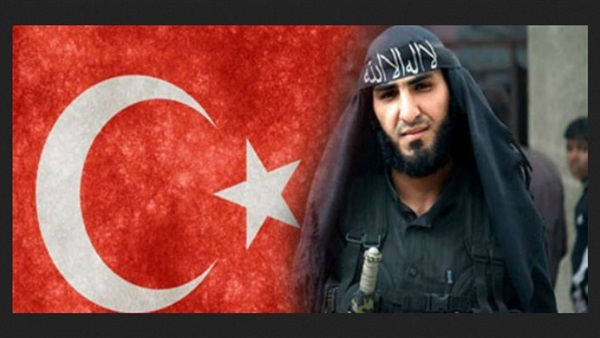US study highlights Turkey's role in supporting Daesh

The RAND Corporation, affiliated with the US Department of Defense
(Pentagon), released a report titled "Turkey’s Double ISIS Standard",
delving into how Ankara claims to oppose Daesh, but Its actions suggest
otherwise.
The report was authored by Ahmet S. Yayla is an adjunct associate
professor at Georgetown University and a former counterterrorism police chief
in Turkey, and Colin P. Clarke is a political scientist at the nonprofit,
nonpartisan Rand Corp. and an associate fellow at the International Centre for
Counter-Terrorism.
The researchers denounced statements of the Turkish government after
the decline of the Islamic State, nearly four years after its emergence, was
the result of an aggressive military campaign to combat the group spearheaded
primarily by the United States. That has not stopped Turkish Minister of
Foreign Affairs Mevlut Cavusoglu from writing an article for Foreign Policy to
take credit for the group’s demise, insisting that Turkey’s actions in northern
Syria have helped lay the groundwork for a sustainable peace.
They decried that he neglected to mention is that it was Turkey’s
actions, or perhaps the lack thereof, that helped fuel the rise of the Islamic
State in the first place. The two most commonly cited factors leading to the
growth of the Islamic State are the Syrian civil war and the government of
former Iraqi Prime Minister Nouri al-Maliki and its persecution of Sunni Arabs in
Iraq. But another significant part of this story is the negligence exhibited by
the Turkish state.
The report also revealed Turkey's support to ISIS. Beginning in
late 2013 and early 2014, Turkish border cities became the chief logistical
hubs for foreign fighters seeking to enter Syria and Iraq to join the Islamic
State and other rebel groups. By all accounts, foreign fighters from around the
globe first traveled to Turkey, and then on to Iraq and Syria, forming the
backbone and striking power of the Islamic State.
In 2013 alone, some 30,000 militants traversed Turkish soil,
establishing the so-called jihadi highway, as the country became a conduit for
fighters seeking to join the Islamic State. By August 2015, Turkey did
eventually tighten up its borders and agree to engage in strike missions as
part of Operation Inherent Resolve, but by then, the lion’s share of foreign
fighters had already arrived in Iraq and Syria.
The researchers unveiled more examples of Turkey’s passive support
to Islamic State fighters, including wounded Islamic State militants treated
for free at hospitals across southeastern Turkey. Among those receiving care
was one of the top deputies of Islamic State chieftain Abu Bakr al-Baghdadi,
Ahmet el-H, who was treated in a private hospital in Sanliurfa in August 2014.
There were also widespread reports of Turkish officials, including
Turkish President Recep Tayyip Erdogan’s son-in-law, were involved in the
purchase of Islamic State oil through front companies — actions that
undoubtedly helped fill the insurgents’ coffers and directly contribute to the
group’s longevity. Nevertheless, contraband Islamic State oil was consistently
sold at points along the Turkish border throughout 2014 and into 2015.
Fast forward to early 2018, and there are reports that Erdogan has
signaled consent for Turkish forces to enlist the help of former Islamic State
fighters in Ankara’s ongoing battle against the Kurds. And according to
Conflict Armament Research, an organization partly funded by the European Union
that identifies and tracks conventional weapons and ammunition in contemporary
armed conflicts, Turkey “is the most important choke point” for components used
in the manufacture of improvised explosive devices by the Islamic State.
The researchers say despite Turkey’s claim of being responsible for
the demise of the Islamic State, the evidence clearly suggests otherwise. But
what about Cavusoglu’s assertion that Turkey’s intervention in Syria through
Operation Olive Branch, a Turkish military offensive in northern Syria aimed at
combating Kurdish militants.
The researchers rebutted Cavusoglu claims that “the territorial
integrity of states” is a prerequisite for peace even as Turkey intervenes in
Syria, together with other powerful nation-states, including Iran, Russia, and
the United States. Like every nation, Turkey has the right to defend its own
borders. But Olive Branch was a preemptive strike against the Syrian Kurds for
Turkey’s own purposes — it is no secret that Ankara has long harbored ill will
against Syrian Democratic Union Party (PYD), Kurds based on their links to the
Kurdistan Workers’ Party (PKK), a banned Turkish terrorist group, and their
admiration for jailed PKK leader Abdullah Ocalan.







